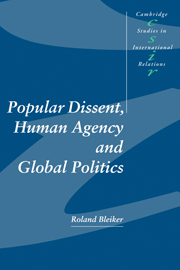Book contents
- Frontmatter
- Contents
- Acknowledgements
- Prologue: Theorising transversal dissent
- Introduction: Writing human agency after the death of God
- Part I A genealogy of popular dissent
- 1 Rhetorics of dissent in Renaissance Humanism
- 2 Romanticism and the dissemination of radical resistance
- 3 Global legacies of popular dissent
- Part II Reading and rereading transversal struggles
- Part III Discursive terrains of dissent
- Conclusion: The transitional contingencies of transversal politics
- Index
- CAMBRIDGE STUDIES IN INTERNATIONAL RELATIONS
3 - Global legacies of popular dissent
Published online by Cambridge University Press: 23 October 2009
- Frontmatter
- Contents
- Acknowledgements
- Prologue: Theorising transversal dissent
- Introduction: Writing human agency after the death of God
- Part I A genealogy of popular dissent
- 1 Rhetorics of dissent in Renaissance Humanism
- 2 Romanticism and the dissemination of radical resistance
- 3 Global legacies of popular dissent
- Part II Reading and rereading transversal struggles
- Part III Discursive terrains of dissent
- Conclusion: The transitional contingencies of transversal politics
- Index
- CAMBRIDGE STUDIES IN INTERNATIONAL RELATIONS
Summary
It seems that we are born half-way between the beginning and the end of the world. We grow in open revolt almost as furiously against what draws us onward as against what holds us back.
The previous two chapters have traced the modern idea of popular dissent back to its Renaissance origins and then observed its radicalisation and transversal dissemination during the romantic period. The inquiry has focused on interpretations of Étienne de la Boétie's Anti-One,a sixteenth-century treatise that was presented not as an authentic starting point, but as a text whose broad conceptual wake has influenced the emergence of a tradition of popular dissent. The present chapter observes what happened when the legacy of this tradition entered the twentieth century.
During the twentieth century practices of popular dissent surged and became increasingly global in nature and scope. There is no way a survey could possibly do justice to the complexity of these phenomena and the various perceptions of human agency that they espouse. An analysis can, however, evoke some of the main themes that have come to play a crucial role in our understanding of dissent. For this purpose I investigate practices of direct action, a specifically la Boétiean form of resistance that is employed when the official channels for political action, such as elections, referenda, petitions or lobbying do not exist or are considered inadequate for the resolution of the conflict in question.
- Type
- Chapter
- Information
- Popular Dissent, Human Agency and Global Politics , pp. 96 - 116Publisher: Cambridge University PressPrint publication year: 2000

